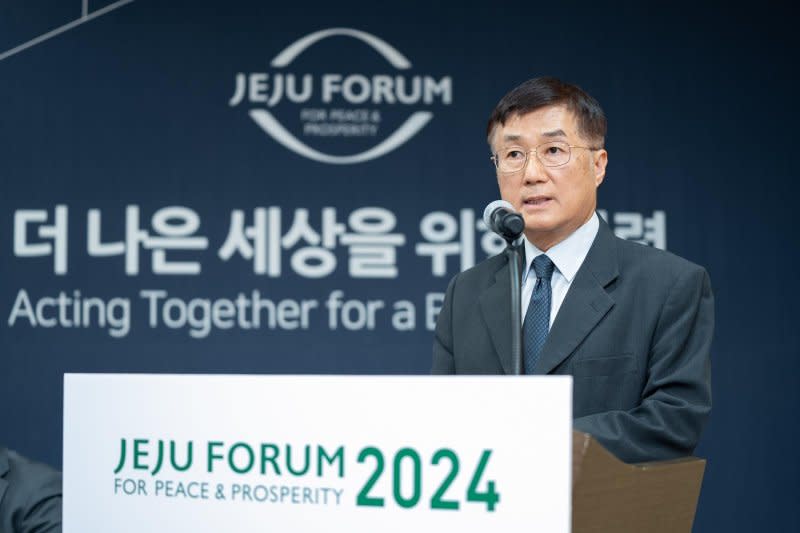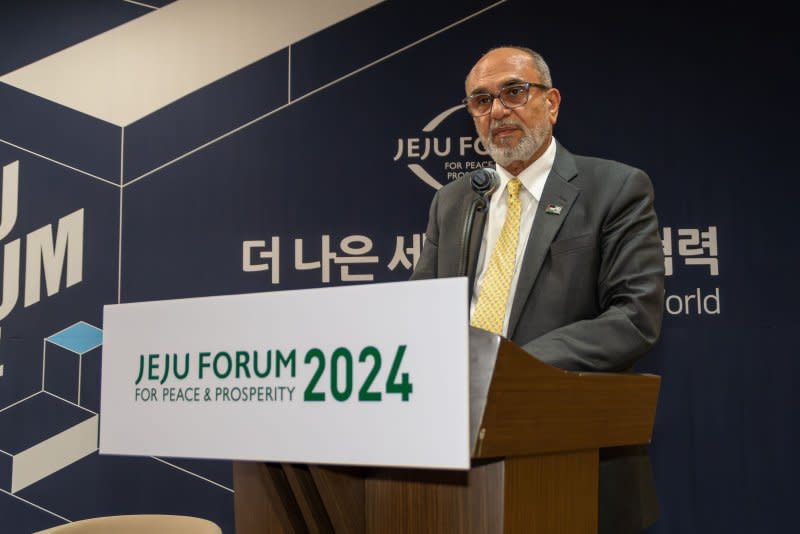Ex-South Korean ambassador: Now is 'right time' to consider recognizing Palestinian state

JEJU ISLAND, South Korea, June 10 (UPI) -- It is the right time for South Korea to consider moving toward recognizing the State of Palestine, Seoul's former ambassador to Israel said as several nations have taken the mostly symbolic step amid Israel's war in Gaza.
"I think it is time for my government to give more attention to this issue," Ma Young-sam, the former ambassador of South Korea to Israel and the inaugural chief of the nation's office in Palestine, said late last month.
Ma made the comment during the Jeju Forum for Peace and Prosperity held at the end of May on South Korea's southern resort island of Jeju. He was responding to the question of whether he thought South Korea should recognize a Palestinian state after the three European nations of Ireland, Spain and Norway had formally taken the step to do so just days earlier.
He was quick to state that he no longer represents Seoul as he is retired but said South Korea has recently voted three times in favor of Palestine becoming a member of the United Nations.
To be a member of the United Nations, one must be a state, he said, "so, my government thinks that Palestine has such a qualification already" adding he believes it is the "right time" for the South Korean government to "consider more favorably this direction."

Days after he spoke, Slovenia also recognized a Palestinian state, becoming the 147th U.N. member to do so.
Though the move has no direct effect on Palestine's standing in the international community or United Nations, where it enjoys observer status, it means the nations recognize the State of Palestine by its borders of 1967 that include the West Bank, East Jerusalem and the Gaza Strip.
Urgency to recognize a Palestinian state comes amid Israel's war in the Palestinian enclave of Gaza that began Oct. 7 when Hamas launched a bloody surprise attack on the Middle Eastern country, killing 1,200 Israelis and taking another 250 or so hostage.
International support for Israel, which was strong at the start of the campaign, has weakened as the death toll has ballooned to the tens of thousands and over the lack of aid it has permitted into the enclave.
Supporters of the movement argue that recognizing Palestine as a state will hasten the manifestation of a two-state solution. An expert panel of the United Nations earlier this month even called for its members to recognize the State of Palestine, stating it is "an important acknowledgment of the rights of the Palestinian people and their struggles and suffering toward freedom and independence."
While on the other hand, some nations, such as the United States, first call for the creation of two states before Palestine is recognized.
Israel has balked at nations who have taken the step to recognize Palestine amid its war as rewarding the Iran-backed militia for its war crimes while strengthening its benefactor.
Ma suggested that South Korea would be more willing to take the step of recognizing a Palestinian state once relations between Israel and the Palestinian Authority improve and the situation on the ground calms.
"We want to see the war should be ended very soon and also more confidence-building processes should be encouraged and strengthened and then we want to see Palestine as a state and full membership at the United Nations," he said.
In his speech during the session dedicated to the role of Asian powers in resolving the Israeli-Palestinian conflict at the peace forum, Ma said his country could act as a "peace promoter" in calling for negotiations to lead to the release of hostages and a cease-fire.
It should also consider participating in peacekeeping forces once the war is over.
And, it should drastically increase its aid to Palestinians.
The leverage South Korea has is in the conflict is "far less" than that of other nations, especially the United States, which Israel has been at odds with over the conflict, so it needs to take those areas where it does have influence "more seriously," he said.
Waleed Siam, the non-resident ambassador of the State of Palestine to South Korea and Japan, told UPI that recognizing Palestine as a state is about protecting its borders and the rights of its people to freely live within them.
He said doing so aligns with U.N. support for a two-state solution and international law. It also proclaims that Israel is occupying Palestinian land, he said.
"That is them saying that Israel is occupying the State of Palestine and the only way to stop the aggression of the Israelis and the building of new colonies in the West Bank -- which is over 700,000 colonists are living there right now and expanding -- is to stop that stealing that land is to recognize the Palestinian state as 1967 borders," he said.
He was quick to state that the Palestinians "don't want to destroy Israel" but co-exist with them on the grounds of justice, freedom and equality.
"We want our state, which was our state a long time ago," he said.
"We are now willing to share 22% of 78% of our land and we want that 22% to live in harmony and peace."
As of Sunday, more than 37,000 Palestinians have been killed in the eight-month war, according to the Palestinian health ministry. The United Nations relief agency for Palestinians estimates that 1.7 million of Gaza's more than 2 million population has been displaced.


